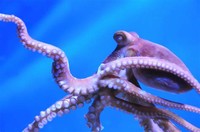Facts about Octopus

Some octopuses, such as the mimic octopus, will move their arms in ways that emulate the movements of other sea creatures.

The collective form octopus is usually reserved for animals consumed for food.

Fowler's Modern English Usage (Fowler 2003) states that "the only acceptable plural in English is octopuses,” and that octopi is misconceived and octopodes pedantic.

An autonomic response keeps the octopus's eyes oriented so that the pupil slit is always horizontal.

Octopuses are highly intelligent, probably more intelligent than any other order of invertebrates.

Most octopuses can eject a thick blackish ink in a large cloud to aid in escaping from predators.

The neurological autonomy of the arms means that the octopus has great difficulty learning about the detailed effects of its motions.

An octopus's camouflage is aided by specialized skin cells which can change the apparent color, opacity, and reflective ability of the epidermis.

Many species of octopus are eaten as food by human cultures around the world.
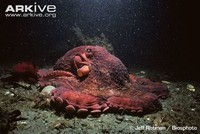
Larger species, such as the North Pacific Giant Octopus, may live for up to five years under suitable circumstances.

Humans utilize octopuses as food as well as display them live in public and private aquariums.

Some squid species lose their tentacles in post-larval stages, and thus the adult only has eight arms like the octopus (O'Shea 2006).

Octopuses crawl by walking on their arms, usually on many at once, on solid surfaces, while supported in water.

A common belief is that when stressed, an octopus may begin to eat its own arms.
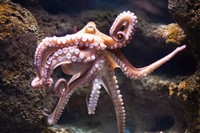
Octopuses have a relatively short life span, and some species live for as little as six months.
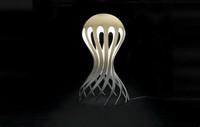
The octopuses in the less familiar Cirrata suborder have two fins and an internal shell, generally lessening their ability to squeeze into small spaces.

The variation in size and life span among octopus species makes it difficult to know how long a new specimen can naturally be expected to live.

The octopus's suckers are equipped with chemoreceptors so that the octopus can taste what it is touching.

That is, a small octopus may be just born or may be an adult, depending on the species.

Octopuses belong to the subclass Coleoidea along with squids, cuttlefish, and extinct belemites.
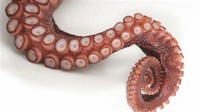
Octopus arms show a wide variety of complex reflex actions arising on at least three different levels of the nervous system.

An octopus has a highly complex nervous system, only part of which is localized in its brain.

Some authoritative sources consider octopuses to be the only acceptable plural form of octopus, while other sources also recognize octopi and rarely octopodes.

Octopuses often escape even from supposedly secure tanks, due to their intelligence, problem-solving skills, mobility, and lack of rigid structure.

Octopuses draw water into their mantle cavity where it passes through its gills.

Octopuses are characterized by their eight arms (not tentacles), usually bearing suction cups.

Octopuses often break out of their aquariums and sometimes into others in search of food.

Octopuses' fastest movements only occur when provoked by hunger or if in danger.

Octopuses have also been observed in what some have described as play: repeatedly releasing bottles or toys into a circular current in their aquariums and then catching them (Mather and Anderson 1998).

Like all cephalopods, octopuses have bilateral symmetry, a prominent head, and a modification of the mollusk foot into the form of arms or tentacles surrounding the mouth, which has beak-like jaws.

The following is based on their classification of the extant octopuses and their placement within Cephalopoda.

Octopus is a common ingredient in Japanese cuisine, including sushi, takoyaki, and Akashiyaki.

The Oxford American College Dictionary (2002) similarly states that the standard plural is octopuses, but also finds acceptable octopodes, since the word comes from Greek and the Greek plural form is octopodes.

Octopuses inhabit many diverse regions of the ocean, especially coral reefs.
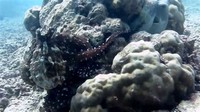
When octopuses reproduce, males use a specialized arm called a hectocotylus to insert spermatophores (packets of sperm) into the female's mantle cavity.

Octopus blood contains the copper-rich protein hemocyanin for transporting oxygen.

The octopus (Greek ????????, “eight-legs”) is any cephalopod (class Cephalopoda, phylum Mollusca) belonging to the order Octopoda.

The tension receptors are not sufficient for the octopus brain to determine the position of the octopus's body or arms.

Two-thirds of an octopus's neurons are found in the nerve cords of its arms, which have a remarkable amount of autonomy.

When under attack, some octopuses can detach their own limbs, in a similar manner to the way skinks and other lizards detach their tails.

The term odonate has been coined to provide an English name for the group as a whole, while the term "true dragonfly" may be used in reference to just the Anisoptera.

The very venomous blue-ringed octopus becomes bright yellow with blue rings when it is provoked.
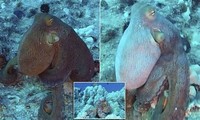
Three defensive mechanisms are typical of octopuses: ink sacs, camouflage, and autotomising limbs.

A few species, such as the mimic octopus, have a fourth defense mechanism.

The arms contain tension sensors so that the octopus knows whether its arms are stretched out.
Octopuses are ocean creatures that are most famous for having eight arms and bulbous heads. Some other fun facts: They have three hearts and blue blood; they squirt ink to deter predators; and being boneless, they can squeeze into (or out of) tight spaces. They are quite intelligent and have been observed using tools.Jun 8, 2017
Octopuses are one of the most interesting sea creatures. ... Because of that, octopus loses its shape when it is pulled out of the water. Interesting Octopus Facts: All octopuses have head, called mantle, surrounded with 8 arms, called tentacles.
Like other cephalopods, the octopus is bilaterally symmetric with two eyes and a beak, with its mouth at the centre point of the arms (which are sometimes mistakenly called "tentacles"). The soft body can rapidly alter its shape, enabling octopuses to squeeze through small gaps.
An octopus has three hearts, nine brains, and blue blood. Two hearts pump blood to the gills, while a third circulates it to the rest of the body. The nervous system includes a central brain and a large ganglion at the base of each arm which controls movement.Aug 22, 2012
Well, the cephalopods—that's the octopuses, squids and cuttlefish—they are unique in that all these ganglias have condensed so they form a centralized brain. ... What's interesting about the octopus is about one third of the neurons (nerve cells) are in the brain.Feb 27, 2009
As with most creatures, the octopus's main purpose in life is to reproduce. However, if it knew just what was waiting for it soon after, it might think twice. Both the male and female octopuses die soon after mating. The male dies a few months afterwards, while female dies shortly after the eggs hatch.
The first time I saw someone eating a live octopus was in the movie Old Boy and I thought it was just a far too gross scene made up by its creators. But later I learnt it's an actual Korean dish, a rather dangerous one because if you don't prepare it properly, the tentacles can stick to your throat and kill you.Dec 11, 2014
Live octopus is a delicacy in South Korea but is a known choking hazard, since the still-moving suction cups can cause tentacle pieces to stick in a person's throat. A baby octopus is often consumed whole, while larger varieties are cut up and the still-wriggling tentacles eaten with a splash of sesame oil.Sep 13, 2013
Nearly all octopuses are predatory; bottom-dwelling octopuses eat mainly crustaceans, polychaete worms, and other molluscs such as whelks and clams; open-ocean octopuses eat mainly prawns, fish and other cephalopods.

